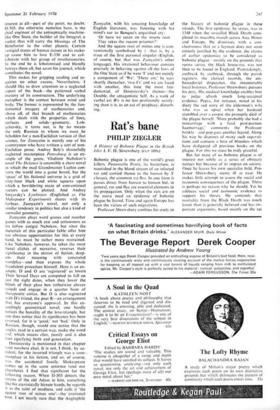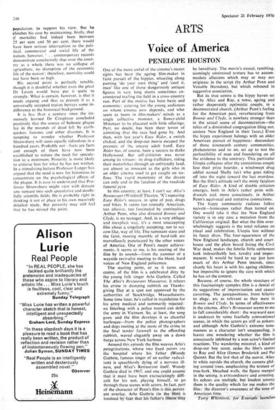Rat's bane
PHILIP ZIEGLER
A History of Bubonic Plague in the British Isles J. F. D. Shrewsbury (cut. 160s) Bubonic plague is one of the world's great killers. Pasteurella Pest is, its bacterium, is nourished in the blood stream of an infected rat and carried thence to the human by X cheopis, the common rat flea. In one form it passes direct from human to human but, in general, rat and flea are essential elements in its propagation. Only when the rats are on the move need an epidemic of bubonic plague be feared. Time and again Europe has been the victim of such migrations.
Professor Shrewsbury confines his study to
the history of bubonic plague in these islands. The first epidemic, he states, was in 1348 when the so-called Black Death com- pleted its macabre march across Asia Minor and Europe. He dismisses, with a con- clusiveness that to a layman does not seem entirely justified by the evidence, the claims of earlier epidemics to be considered as bubonic plague--mainly on the grounds that rattus rattus, the black house-rat, was not then to be found in England. Painstakingly, outbreak by outbreak, through the parish registers, the clerical records, the am- bassadorial dispatches, the innumerable local histories, Professor Shrewsbury pursues his prey. His medical knowledge enables him to judge afresh much long-accepted evidence. Pepys, for instance, noted in his diary the sad story of the alderman's wife who was so upset when her husband stumbled over a corpse she promptly died of the plague herself. 'More probably she had a miscarriage with a fatal post-partum haemorrage,' comments the Professor briskly-- and pop goes another legend. Along - his way he disposes of many such supersti- tions and corrects a host of blunders which have disfigured all previous books on the plague. For this we must be truly grateful.
But for most of us bubonic plague is of interest not solely as a series of obituary notices but because of its impact on society. Once he leaves his own specialist field, Pro- fessor Shrewsbury seems ill at ease. He makes little attempt to assess the social and economic consequences of the plague. There is perhaps no reason why he should. Yet he adduces social and economic evidence to support his theses. He contends that mortality from the Black Death was much lower than is generally believed and has im- portant arguments, based mainly on the rat population, to support his view. But he clinches his case by maintaining, firstly, that if mortality had indeed been between 25 per cent and 50 per cent, there would have been serious interruption to the poli- tical, commercial and social life of the nation; however. . . contemporary records demonstrate conclusively that over the coun- try as a whole there was no collapse of agriculture, no disruption of the economic life of the nation'; therefore, mortality could not have been so high.
His second point is perfectly tenable, though it is doubtful whether even the great Dr Levett would have put it quite so strongly. What is certain, however, is that it needs arguing and that to present it as a universally accepted truism betrays some in- difference to the historical background.
It is less than a century since the im- mensely learned Dr Creighton concluded positively that the source of bubonic plague lay in the mounds of dead left by earth- quakes, famines and other disasters. It is tempting to wonder whether Professor Shrewsbury will seem equally ridiculous in a hundred years. Probably not—facts are facts and enough of them have now been established to reduce the need for specula- tion to a minimum. Posterity is more likely to criticise him for what he has not written. In a stimulating. lecture Professor Langer has argued that the need is now for historians to concentrate on the psychological effects of the plague. It is easy to understand that Pro- fessor Shrewsbury might view with distaste any venture into such speculative and doubt- fully scientific fields. He is probably right in thinking it out of place in his own massively detailed study. But posterity may still feel that he has missed the point.



































 Previous page
Previous page